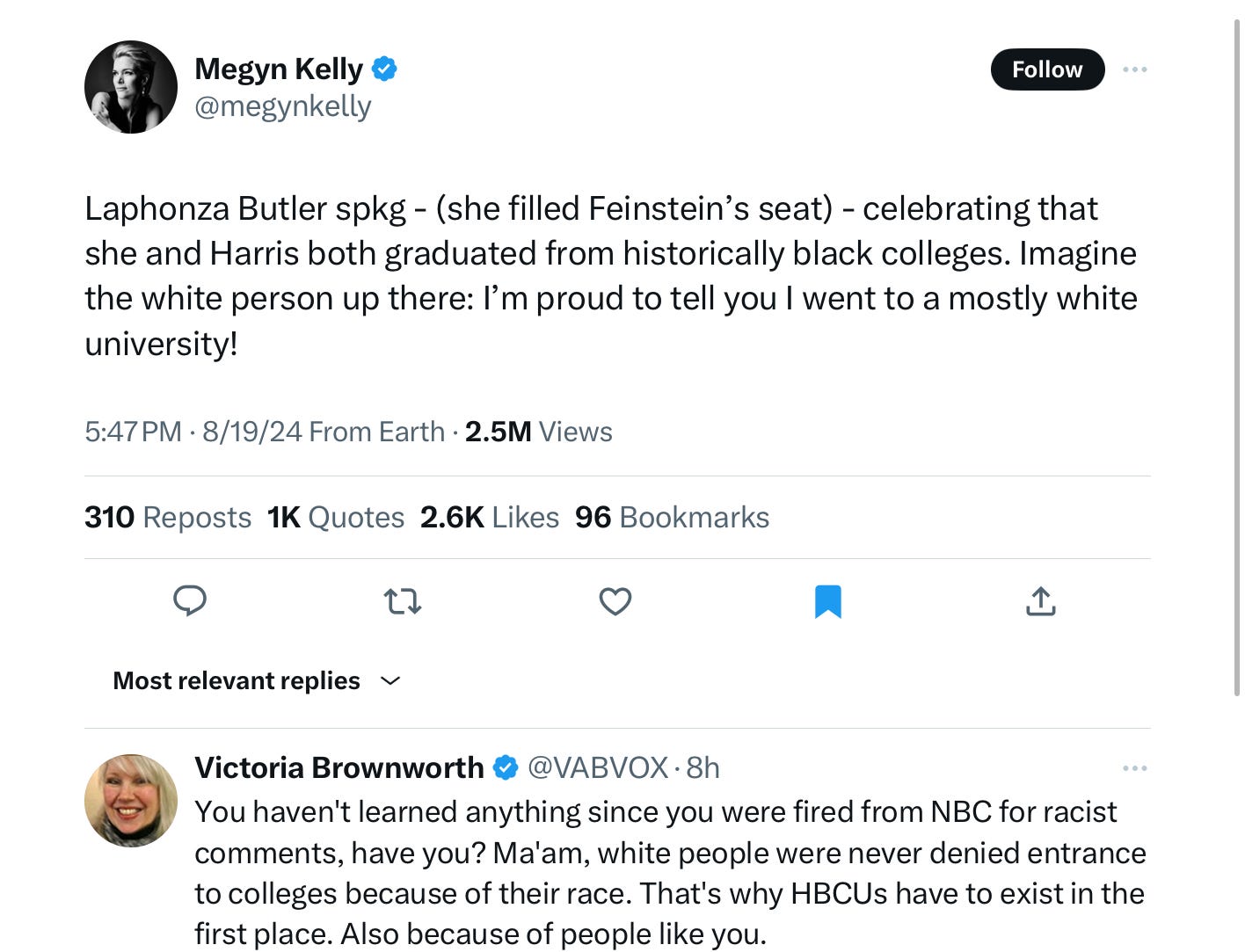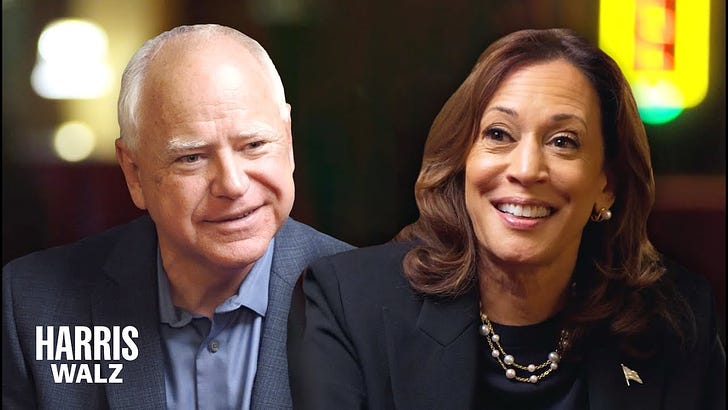Some Historically Black College History For Historically Ignorant Megyn Kelly
When Laphonza Butler, the junior senator from California and just the second Black woman to hold that position, spoke at the Democratic National Convention Monday, the audience cheered and applauded when Butler mentioned that both she and Vice President Kamala Harris had graduated from historically black colleges.
This infuriated Megyn Kelly, a vocal advocate for historically white Santas. Kelly posted on social media:
Laphonza Butler spkg - (she filled Feinstein’s seat) - celebrating that she and Harris both graduated from historically black colleges. Imagine the white person up there: I’m proud to tell you I went to a mostly white university!
The MAGA movement feeds on white grievance and victimization. They take personal offense at other people’s joy and hold the paranoid belief that society caters to the marginalized. They are both the persecuted and the triumphant. NBC paid Blackface arts historian Kelly $69 million to just go away, but instead of spending the rest of her life holding bags of money in each hand and shouting, “Yippee, yippee!” she’s rage-posting clickbait on social media. She accused Minnesota Gov. Tim Walz of self-loathing anti-white racism because he joked about his own spice tolerance, and now she suggests it’s racist for Black people to feel any pride about attending a historically Black college or university.
Why HBCUs exist, dummy
The oldest historically Black college is Cheyney University of Pennsylvania, which was founded in 1837. Quaker philanthropist Richard Humphreys bequeathed one-tenth of his estate to establish a school for people of African descent. Stephen Miller might try to sue him retroactively.
Most HBCUs are located in the Southern United States, where Black residents paid taxes that funded state colleges yet were denied admission to them based on their race. Alabama has the greatest number of HBCUs, then North Carolina and Georgia.
Laphonza Butler attended Jackson State University in Mississippi. One of the largest HBCUs in the country, Jackson State University was founded in 1877. Originally Natchez Seminary, the school changed its name to Jackson College in 1883. It’s been known as the Mississippi Negro Training School, the Jackson College for Negro Teachers, and eventually after desegregation, Jackson State College.
James Howard Meredith, an Air Force veteran, had attended Jackson State College but was rejected when he attempted to enroll in the all-white University of Mississippi in 1960. Despite the Supreme Court’s desegregation ruling, Governor Ross Barnett denied him entry into the school. Segregationist rioters tried to prevent Meredith’s admission in what was known as the “Battle of Oxford.” President John F. Kennedy mobilized more than 30,000 federal troops to end the disturbance.
Meredith would eventually become the first Black student at the University of Mississippi in 1962. U.S. deputy marshals and army troops guarded him 24 hours a day, and he endured constant verbal harassment. Meredith’s courage ensured that the University of Mississippi was truly a public university, but we can appreciate how he might not have enjoyed the ideal college experience.
Conversely, HBCUs do not have such a racist history. They have always admitted non-Black students. Kamala Harris attended Howard University in Washington D.C. The school’s namesake, Oliver Otis Howard, was a Union general aligned with the anti-slavery “Radical Republicans.” He lost his right arm in battle against Confederate troops, which earned him the Medal of Honor. He was a true American hero, so obviously Donald Trump would consider him a “sucker.” During Reconstruction, he was given control of the Freedman’s Bureau and attempted to truly integrate the formerly enslaved into Southern society, but President Andrew Johnson opposed his efforts to promote Black education and economic advancement.
Howard University was founded in 1867 with the stated purpose to "uplift African-Americans, especially those recently freed from slavery.” Howard, who served as the school’s president from 1869 to 1874, explained why this specific institution was necessary: “[the] opposition to Negro education made itself felt everywhere in a combination not to allow the freed men any room or building in which a school might be taught. In 1865, 1866, and 1867, mobs of the baser classes at intervals and in all parts of the South occasionally burned school buildings and churches used as schools, flogged teachers or drove them away, and in a number of instances murdered them.”
The first students at Howard were white women — daughters of two of the founders. They probably didn’t have a step team yet.
The Trouble With HBCUs
HBCUs are inconvenient for people like Megyn Kelly who’d prefer there were no active reminders of America’s openly racist history. Kamala Harris and Laphonza Butler didn’t attend an Ivy League school like Yale or Harvard, so mediocre white people can’t suggest they only gained admittance because of Affirmative Action or a BET game show. Donald Trump, whose academic record is hardly impressive, claimed in 2011 that President Barack Obama was a “terrible student,” who somehow got accepted into Columbia University for undergrad and then Harvard Law School.
“How does a bad student go to Columbia and then to Harvard? I’m thinking about it, I’m certainly looking into it. Let him show his records,” Trump said. “I have friends who have smart sons with great marks, great boards, great everything and they can’t get into Harvard.”
Of course, if Trump’s white friends’ stupid kids couldn’t get into Harvard, his racist pea brain can’t fathom how a Black person was admitted.
Butler and Harris are successful Black women who chose to attend a historically Black college. The Harris/Walz ticket has no connection to the Ivy League. This doesn’t mean Harris wasn’t smart enough to join Barack and Michelle Obama at Harvard, but considering the clear professional implications, it says a lot that in 1982, Harris prioritized the Black experience.
The fictional Hillman College from A Different World was based in part on Howard. There’s a 1990 episode where Dwayne Wayne’s (Kadeem Hardison) childhood friend tries to convince him to leave Hillman for a non-HBCU because he believes “you become the best by being with the best” (i.e. white people).
“A school like this gives you a false since of reality,” Dwayne’s friend tells him. “Everybody’s Black. Everybody's equal. That’s not the real world.”
Confused, Dwayne confides in Whitley (Jasmine Guy), who tells him Hillman was always her first choice. “I was accepted at Georgetown, and when I turned them down my guidance counselor threw a hissy fit,” she says. “She couldn’t understand why a girl with so much to offer like myself would limit myself at a school like Hillman.”
Whitley explains that when her great-grandfather was “all but accepted at this certain Ivy League school until he showed up for the interview.” He went to Hillman, which provided him with not just an education but a sense of belonging. Apparently very long-lived, Whitley’s great-grandfather told her, “Baby, you can go to school anyplace but no school will love you and teach you to love yourself and know yourself like Hillman.”
Kelly will attempt to hide her MAGA-courting bigotry behind a supposed “color-blind” philosophy, one that dismisses Black culture entirely. (I’ve seen it argued that HBCUs are fundamentally different from Catholic or Jewish schools because race is not a “real” construct — as if organized religion is wholly organic.) This restrictively defines Black identity as nothing more than a reaction to overt racial prejudice: After enough blood has been shed and white people have finally permitted us into the spaces they dominate, there’s no longer any justification for Black institutions like HBCUs, despite the role they’ve played in the Black community. Many of them were on the frontlines of civil rights activism. They offer a more nurturing and less isolating environment for many Black students. Imagine you’re a Black woman who attended Syracuse University in the late 1980s and got stuck with Megyn Kelly as your roommate?
Republican Sen. Tim Scott is just a year younger than Harris. He attended Presbyterian College in Clinton, South Carolina, on a partial sports scholarship, and he’s described in his memoir how he “heard the N-word many times off and on campus.” This is the humiliation gauntlet that Black people are expected to run with a smile on our faces. Kamala Harris took a different route and might still become the next U.S. president. For Megyn Kelly, this is truly a different world.
I hope you’ll consider becoming a paid subscriber for $80 a year or just $8 a month, if you’re not already. This helps sustain the newsletter and keeps all the content free for everyone.
Follow Stephen Robinson on Bluesky and Threads.
Subscribe to his YouTube channel for more fun content.








Stephen, I first learned that there was such a thing as HBCUs by watching A Different World and the Cosby Show with my kids back in the day. I never really thought about it before, but now I think that that understanding helped me quit feeling defensive about my public university degrees whenever certain Ivy League-educated colleagues in academia delighted in denigrating UT (where we were all working) as a sub-par school. A really smart person had to explain to me that a college education is what you make of it, not where you got it, and you really can get a good education at any college or university if you take full advantage, with a grateful heart, of what it has to offer.
Thanks for the history lesson. Great job, as always.
"Imagine you’re a Black woman who attended Syracuse University in the late 1980s and got stuck with Megyn Kelly as your roommate?" OMG boom.